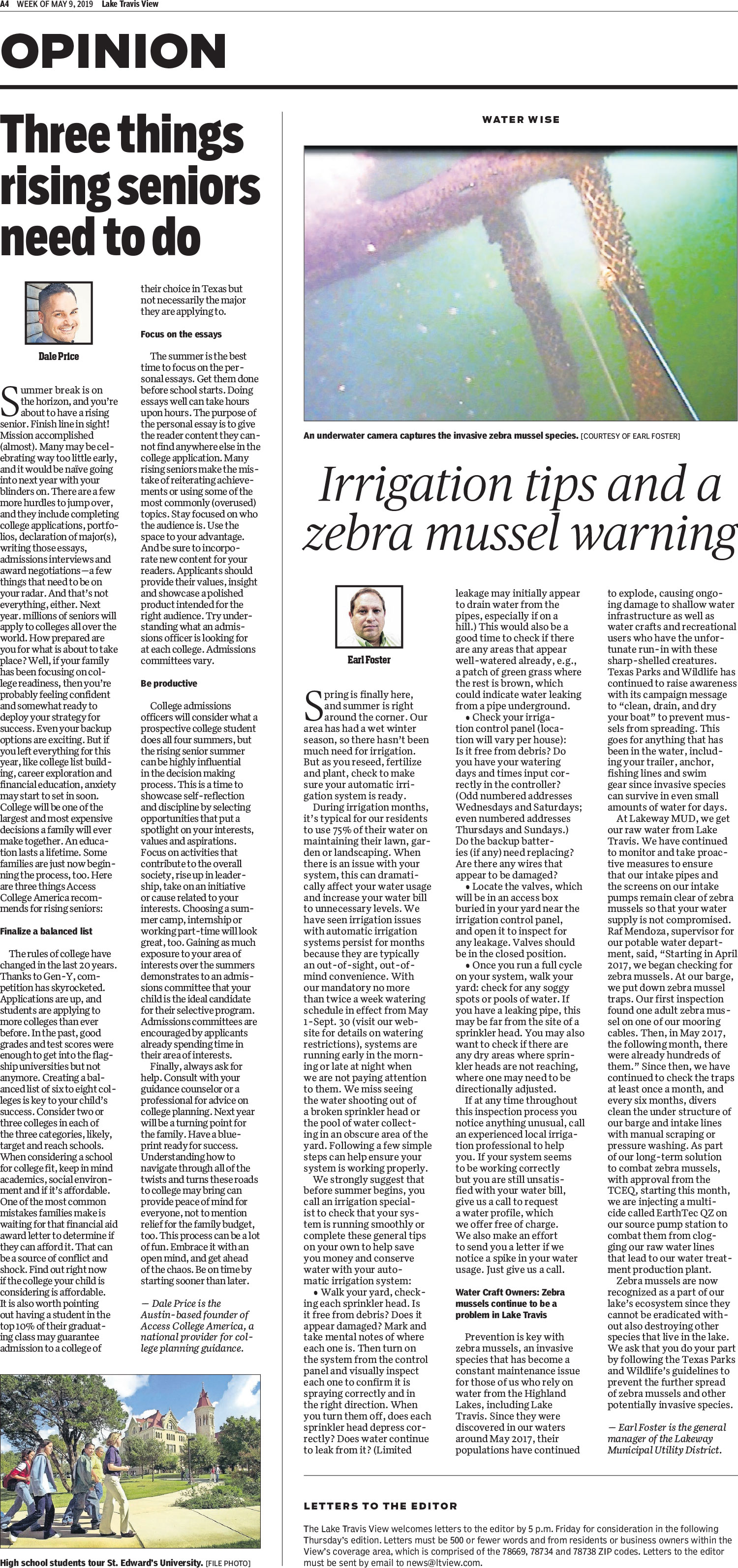Irrigation tips and a zebra mussel warning

As published in the Lake Travis View – week of May 9, 2019.
Irrigation tips and a zebra mussel warning
Spring is finally here and summer is right around the corner! Our area has had a wet winter season so there hasn’t been much need for irrigation, but as you reseed, fertilize, and plant, check to make sure your automatic irrigation system is ready.
During irrigation months, it’s typical for our residents to use 75% of their water on maintaining their lawn, garden, or landscaping. When there is an issue with your system, this can dramatically affect your water usage and increase your water bill to unnecessary levels. We have seen irrigation issues with automatic irrigation systems persist for months because they are typically an out-of-site, out-of-mind convenience. With our mandatory no more than twice a week watering schedule in affect from May 1-Sept 30 (visit our website for details on your addresses’ watering restrictions), systems are running early in the morning or late at night when we are not paying attention to them. We miss seeing the water shooting out of a broken sprinkler head or the pool of water collecting in an obscure area of the yard. Following a few simple steps can help ensure your system is working properly.
We strongly suggest that before summer begins, you call an irrigation specialist to check that your system is running smoothly or complete these general tips on your own to help save you money and conserve water with your automatic irrigation system:
- Walk your yard, checking each sprinkler head: Is it free from debris? Does it appear damaged? Mark and take mental note of where each one is then turn on the system from the control panel and visually inspect each one to confirm it is spraying correctly and in the right direction. When you turn them off, does each sprinkler head depress correctly? Does water continue to leak from it (limited leakage may initially appear to drain water from the pipes, especially if on a hill)? This would also be a good time to check if there are any areas that appear well-watered already (ie: patch of green grass where the rest if brown), which could indicate water leaking from a pipe underground.
- Check your irrigation control panel (location will vary per house): Is it free from debris? Do you have your watering days and times input correctly in the controller (odd number address Wednesdays and Saturdays; even numbered address Thursdays and Sundays)? Do the backup batteries (if any) need replacing? Are there any wires that appear to be damaged?
- Locate the valves, which will be in an access box buried in your yard near the irrigation control panel, and open it to inspect for any leakage. Valves should be in the closed position.
- Once you run a full cycle on your system, walk your yard: check for any soggy spots or pools of water. If you have a leaking pipe, this may be far from the site of a sprinkler head. You may also want to check if there are any dry areas where sprinkler heads are not reaching, where one may need to be directionally adjusted.
If at any time throughout this inspection process you notice anything unusual, call an experienced local irrigation professional to help you. If your system seems to be working correctly but you are still unsatisfied with your water bill, give us a call to request a water profile, which we offer free of charge. We also make an effort to send you a letter if we notice a spike in your water usage. Just give us a call.
WATER CRAFT OWNERS: ZEBRA MUSSLES CONTINUE TO BE A PROBLEM IN LAKE TRAVIS
Prevention is key with zebra mussels, an invasive species that has become a constant maintenance issue for those of us who rely on water from the Highland Lakes, including Lake Travis. Since they were discovered in our waters, around May of 2017, their populations have continued to explode, causing ongoing damage to shallow water infrastructure as well as water crafts and recreational users who have the unfortunate run-in with these sharp-shelled creatures. The Texas Parks and Wildlife have continued to raise awareness with their campaign to prevent further spreading with their message to “clean, drain, and dry your boat.” This goes for anything that has been in the water, including your trailer, anchor, fishing lines, and swim gear since invasive species can survive in even small amounts of water for days.
At Lakeway MUD, we get our raw water from Lake Travis. We have continued to monitor and take proactive measures to ensure that our intake pipes and the screens on our intake pumps remain clear of zebra mussels so that your water supply is not compromised. Raf Mendoza, supervisor for our potable water department, said, “Starting in April 2017, we began checking for zebra mussels. At our barge, we put down zebra mussel traps. Our first inspection found one adult zebra mussel on one of our mooring cables. Then, in May 2017, the following month, there were already hundreds of them.” Since then, we have continued to check the traps at least once a month and every 6 months, divers clean the under structure of our barge and intake lines with manual scraping or pressure washing. As part of our long-term solution to combat zebra mussels, with approval from the TCEQ, starting this month we are injecting a multicide called EarthTec QZ on our source pump station to combat them from clogging our raw water lines that lead to our water treatment production plant. Zebra mussels are now recognized as a part of our lake’s ecosystem since they cannot be eradicated without also destroying other species that live in the lake. We ask that you do your part by following the Texas Parks and Wildlife’s guidelines to prevent the further spread of zebra mussels and other potentially invasive species.


 You are now being redirected to the WaterSmart page.
You are now being redirected to the WaterSmart page.